Huayan Guo
A Novel Pilot Scheme for Uplink Channel Estimation for Sub-array Structured ELAA in XL-MIMO systems
Dec 11, 2025Abstract:This paper proposes a novel pilot scheme for multi-user uplink channel estimation in extra-large-scale massive MIMO (XL-MIMO) systems with extremely large aperture arrays (ELAA). The large aperture of ELAA introduces spatial non-stationarity, where far-apart users have significantly distinct visibility at the antennas, thereby reducing inter-user interference. This insight motivates our novel pilot scheme to group users with distinct visibility regions to share the same frequency subcarriers for channel estimation, so that more users can be served with reduced pilot overhead. Specifically, the proposed pilot scheme employs frequency-division multiplexing for inter-group channel estimation, while intra-group users -- benefiting from strong spatial orthogonality -- are distinguished by shifted cyclic codes, similar to code-division multiplexing. Additionally, we introduce a sub-array structured ELAA, where each sub-array is a traditional MIMO array and treated as spatial stationary, while the distances between sub-arrays can be significantly larger to achieve an expanded aperture. The channel support for sub-arrays features clustered sparsity in the antenna-delay domain and is modeled by a 2-dimensional (2-D) Markov random field (MRF). Based on this, we propose a low-complexity channel estimation algorithm within a turbo Bayesian inference framework that incorporates the 2-D MRF prior model. Simulations show that the proposed scheme and algorithm allow the XL-MIMO system to support more users, and deliver superior channel estimation performance.
Channel Estimation and Passive Beamforming for Pixel-based Reconfigurable Intelligent Surfaces with Non-Separable State Response
Oct 23, 2025



Abstract:Pixel-based reconfigurable intelligent surfaces (RISs) employ a novel design to achieve high reflection gain at a lower hardware cost by eliminating the phase shifters used in traditional RIS. However, this design presents challenges for channel estimation and passive beamforming due to its non-separable state response, rendering existing solutions ineffective. To address this, we first approximate the non-separable RIS response functions using a kernel-based method and a deep neural network, achieving high accuracy while reducing computational and memory complexity. Next, we propose a simplified cascaded channel model that focuses on dominated scattering paths with limited unknown parameters, along with customized algorithms to estimate short-term and long-term parameters separately. Finally, we introduce a low-complexity passive beamforming algorithm to configure the discrete RIS state vector, maximizing the achievable rate. Our simulation results demonstrate that the proposed solution significantly outperforms various baselines across a wide SNR range.
Channel Estimation and Analog Precoding for Pixel-based Fluid-Antenna-Assisted Multiuser MIMO-OFDM Systems
Sep 11, 2025Abstract:Pixel-based fluid antennas provide enhanced multiplexing gains and quicker radiation pattern switching than traditional designs. However, this innovation introduces challenges for channel estimation and analog precoding due to the state-non-separable channel response problem. This paper explores a multiuser MIMO-OFDM system utilizing pixel-based fluid antennas, informed by measurements from a real-world prototype. We present a sparse channel recovery framework for uplink channel sounding, employing an approximate separable channel response model with DNN-based antenna radiation functions. We then propose two low-complexity channel estimation algorithms that leverage orthogonal matching pursuit and variational Bayesian inference to accurately recover channel responses across various scattering cluster angles. These estimations enable the prediction of composite channels for all fluid antenna states, leading to an analog precoding scheme that optimally selects switching states for different antennas. Our simulation results indicate that the proposed approach significantly outperforms several baseline methods, especially in high signal-to-noise ratio environments with numerous users.
Bayesian Deep End-to-End Learning for MIMO-OFDM System with Delay-Domain Sparse Precoder
Apr 29, 2025Abstract:This paper introduces a novel precoder design aimed at reducing pilot overhead for effective channel estimation in multiple-input multiple-output orthogonal frequency division multiplexing (MIMO-OFDM) applications utilizing high-order modulation. We propose an innovative demodulation reference signal scheme that achieves up to an 8x reduction in overhead by implementing a delay-domain sparsity constraint on the precoder. Furthermore, we present a deep neural network (DNN)-based end-to-end architecture that integrates a propagation channel estimation module, a precoder design module, and an effective channel estimation module. Additionally, we propose a Bayesian model-assisted training framework that incorporates domain knowledge, resulting in an interpretable datapath design. Simulation results demonstrate that our proposed solution significantly outperforms various baseline schemes while exhibiting substantially lower computational complexity.
Over-the-Air Aggregation for Federated Learning: Waveform Superposition and Prototype Validation
Oct 27, 2021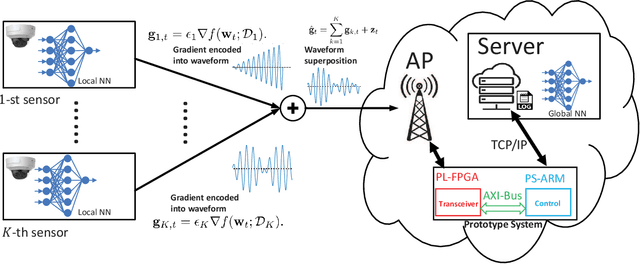
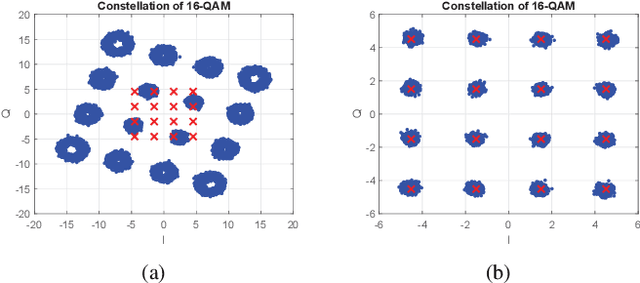
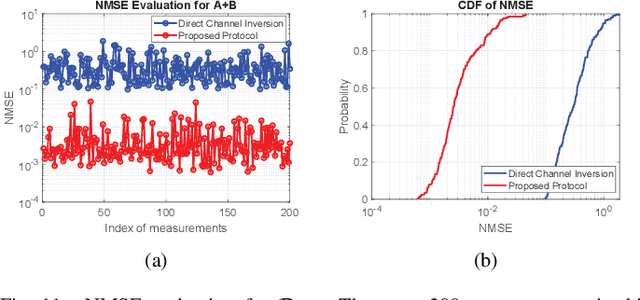
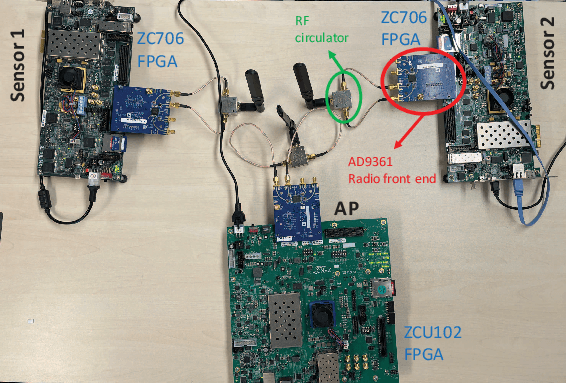
Abstract:In this paper, we develop an orthogonal-frequency-division-multiplexing (OFDM)-based over-the-air (OTA) aggregation solution for wireless federated learning (FL). In particular, the local gradients in massive IoT devices are modulated by an analog waveform and are then transmitted using the same wireless resources. To this end, achieving perfect waveform superposition is the key challenge, which is difficult due to the existence of frame timing offset (TO) and carrier frequency offset (CFO). In order to address these issues, we propose a two-stage waveform pre-equalization technique with a customized multiple access protocol that can estimate and then mitigate the TO and CFO for the OTA aggregation. Based on the proposed solution, we develop a hardware transceiver and application software to train a real-world FL task, which learns a deep neural network to predict the received signal strength with global positioning system information. Experiments verify that the proposed OTA aggregation solution can achieve comparable performance to offline learning procedures with high prediction accuracy.
Cascaded Channel Estimation for Intelligent Reflecting Surface Assisted Multiuser MISO Systems
Aug 20, 2021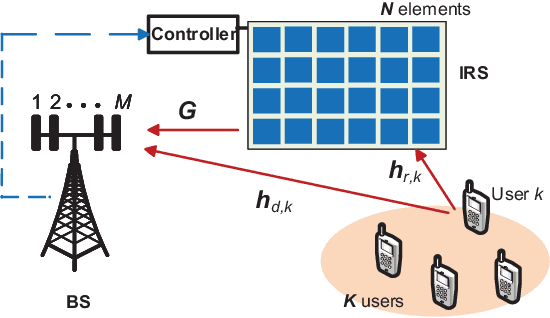
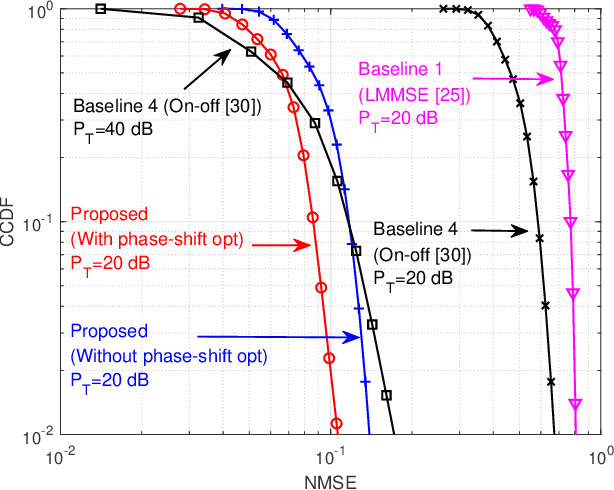
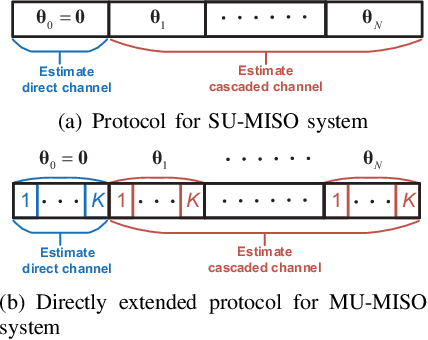

Abstract:This paper investigates the uplink cascaded channel estimation for intelligent-reflecting-surface (IRS)-assisted multi-user multiple-input-single-output systems. We focus on a sub-6 GHz scenario where the channel propagation is not sparse and the number of IRS elements can be larger than the number of BS antennas. A novel channel estimation protocol without the need of on-off amplitude control to avoid the reflection power loss is proposed. In addition, the pilot overhead is substantially reduced by exploiting the common-link structure to decompose the cascaded channel coefficients by the multiplication of the common-link variables and the user-specific variables. However, these two types of variables are highly coupled, which makes them difficult to estimate. To address this issue, we formulate an optimization-based joint channel estimation problem, which only utilizes the covariance of the cascaded channel. Then, we design a low-complexity alternating optimization algorithm with efficient initialization for the non-convex optimization problem, which achieves a local optimum solution. To further enhance the estimation accuracy, we propose a new formulation to optimize the training phase shifting configuration for the proposed protocol, and then solve it using the successive convex approximation algorithm. Comprehensive simulations verify that the proposed algorithm has supreme performance compared to various state-of-the-art baseline schemes.
 Add to Chrome
Add to Chrome Add to Firefox
Add to Firefox Add to Edge
Add to Edge